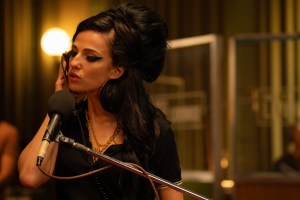Every generation of small-screen hits has its show that catapults a wealth of young actors to stardom.
One only need think back to Skins, Channel 4’s cult mid-noughties TV series about a group of teens discovering themselves — its first season alone featuring now-Hollywood A-listers Nicholas Hoult, Daniel Kaluuya, Kaya Scodelario and Dev Patel.
Industry, from up-and-coming showrunners Mickey Down and Konrad Kay, could be deemed this decade’s version.The BBC–HBO hit has propelled actors including Myha’la, who featured in Netflix’s most-watched 2023 movie, Leave the World Behind, and Harry Lawtey, who plays Harvey Dent in Joker: Folie à Deux, into the stratosphere.
Having starred as Amy Winehouse in the StudioCanal biopic Back to Black and soon to be seen with Cate Blanchett and Michael Fassbender in Steven Soderbergh’s Black Bag, Marisa Abela is another Industry breakout. She plays the flawed, privileged and vulnerable Yasmin Kara-Hanani in Industry, and sits within this stratospheric trio.
“The camaraderie we have, especially between the three of us, Marisa, Myha’la and Harry, is incredibly rare,” Abela says in the weeks after Industry’s HBO premiere. “We started in the same place, on the same show, and we now have this shared understanding of the business through a lens that is quite similar. People have different criteria for what is important in casting, and in Industry, it was just like, ‘We want these young actors to just rip this apart’.”
Myha’la, Harry Lawtey and Marisa Abela in ‘Industry’. Image: BBC/Bad Wolf Productions/HBO/Nick Strasburg
On the surface, a show following financial interns that spotlights the intricacies of the banking sector should have had a one-in-a-million chance of success. Yet it is the Bad Wolf-produced Industry’s cutting take on the pressures of youth, searing dialogue and ability to reinvent itself that has ensured its place as a cornerstone of the HBO schedule, with Season 3 taking up the coveted Sunday 9 p.m. slot when House of the Dragon concluded. Also starring Ken Leung, Sagar Radia and Sarah Parish, Industry charts the goings-on at fictional bank Pierpoint, with a focus on the lives and Machiavellian machinations of Yasmin, Myha’la’s Harper Stern and Lawtey’s Robert Spearing.
That latest season, which launched on HBO in August and the BBC this month, is by far Industry’s splashiest and was boosted by the full might of HBO’s marketing firepower. The season sees Yasmin take on an even bigger role, acting as dual confidante-love interest to Kit Harington’s Henry Muck, the aristocratic billionaire owner of an environmental, social and governance firm — the theme this time being the hypocrisies and hypocrites that rub up against the idea of ‘woke investing’. The season has garnered top reviews with critics and Industry has already been re-upped for a fourth run, while Down and Kay have just had their overall deal with HBO renewed.
“Season 3 was physically and emotionally more difficult than the other two but I’m a bit of a glutton for punishment when it comes to this job,” Abela says. “The scope was just so big. I felt incredibly moved that Mickey and Konrad wanted to give me this moment to let Yasmin rip emotionally.”
Harington, he of “You know nothing Jon Snow” fame, and one of the most high-profile actors that Industry has snared thus far, was “just so brilliant to work with,” Abela adds. She says he brought nuance to a role that could have lacked subtlety in less-gifted hands. “Kit manages to walk an incredible line between that kind of aristocratic separation from reality and being an emotionally vulnerable boy,” she adds. “You feel he needs to be taken care of and then you look at him on a macro scale and he is so powerful.”
Harington’s character helms a fresh type of investment firm as the show’s creators move with the times. Over five years of making Industry, Abela says she is “none the wiser” about the ins-and-outs of stock markets, shares and the FTSE, but has become well versed in “the politics of that world, what kind of people it attracts and what kind of people it repels.”
Growing with Yasmin
Abela has barely had a chance to take stock since the 27-year-old landed the Industry part around six years ago, not long after she had completed her Royal Academy of Dramatic Art studies and with barely a credit to her name. She says she warmed to the scripts immediately while feeling an affinity with a character entering an intimidating business that can chew up and spit out the very best.
“I was being offered two scenes to play someone’s daughter at the time and at that pivotal stage I would have said ‘yes’ to things that were a lot less considered and well written than Industry,” she explains. “The whole point was that it was about these young people and all the nuances of what it is to be just starting out. As someone about to start my own journey it felt so real to me.”
Abela is keen to draw a line between herself and her character — “especially by circumstance” (she grew up in a single-parent household and her mother is an actor, while Yasmin comes from millionaire publishing stock) — and she points out that Yasmin works in an industry where “her ultimate goal will be a by-product of her success, while in acting, the most important goal is the art, and everything else is a by-product.”
But she says she and her character have grown together and “as [Yasmin] has gotten stronger in her willingness to assert herself, there are probably parts of me that have done the same… She wasn’t an assertive person in the workplace at first and didn’t know how to set boundaries. Mickey and Konrad said at the beginning it was important that she had an artifice of confidence and luxury but she felt vulnerable.”
With her ever-thorny relationship with fellow lead Myha’la’s Harper, Abela’s character has become an integral part of the Industry machine as the seasons have rolled on. As time has progressed, she has been given the opportunity to imbue more of her skills as an actor into the character. For example, she has been keen to “bring a sense of humor” to Yasmin, which wasn’t necessarily present in her first couple of episodes, while also handing her a certain dryness. “After a while Mickey and Konrad know us so well, they start writing things they think we can do.”
Down and Kay are relentlessly honest about what they deem the failings of Industry Season 1, describing themselves as “naïve and arrogant” when starting out, branding first drafts “soulless and lifeless” and expressing surprise that they were given a second season.
Abela knows all too well how “incredibly critical of themselves” the pair can be but s ays locating the truth in something can sometimes be a “messy” business. She compares the early Industry episodes to “leaving a party and thinking, ‘Oh sh*t, I wish I had never said that thing which might have been incredibly honest but felt embarrassing and weird at the time.’”
“Sometimes our performances and the Season 1 narrative might have been a bit clunky, but the fact people were willing to forgive and enjoy the show says that it is real, authentic and resonates,” she says.
Abela resolves to relay the ‘leaving a party’ analogy to Down, with whom she is about to have dinner.
Back to Black

Marisa Abela in ‘Back to Black’. Image: Dean Rogers/Focus Features
The experience of working closely with the ex-financier-turned-auteur duo has made Abela consider whether she would like to gain agency by someday working behind the camera, and this feeling was buttressed by playing Winehouse in Back to Black, her biggest movie project to date.
Back to Black was quite the “labor of love”, Abela says, since it involved an intense four-month prep and three-month shoot. “You put so much into it physically and emotionally, and then you leave and a year later it’s different — things exist, and things don’t exist,” she adds. “That was hard. If I did a job like that again, it would be good to have a way of being in the room more.”
With many months having passed since the world was introduced to Back to Black, Abela, without a hint of arrogance, stresses several times that she is “proud,” not of landing the part but of how hard she worked and how she was able to do Winehouse’s story “justice.”
Playing such an icon took its toll, Abela says, and she “wouldn’t do one of those jobs every year.”
Sam Taylor-Johnson’s movie faced intense scrutiny for the decision to portray the iconic star whose short life was badly damaged by drugs and booze, depicting her decline alongside the lives of those closest to her whose experiences have been probed many times over.
This scrutiny was heightened when pictures began to emerge of Abela filming around Soho with the famous Winehouse ‘beehive’. And that scrutiny ramped up by a factor of 10 when the trailer was rolled out. Abela says she subsequently “switched everything off”, adding, “I firmly believe that the enemy of actors is self-consciousness. As soon as you start being vain, self-conscious or aware of yourself in the moment then you cannot be present.”
In the end she had little to worry about. The movie was reviewed pretty warmly while Abela’s performance was roundly praised, with Deadline’s Pete Hammond tipping her as an outside Oscar bet. “So much of being exposed in the way that we are can be linked with shame and I don’t think that’s a useful emotion in any way, so I’m proud I worked as hard as I did,” Abela says.
Next up is Black Bag, the under-wraps Soderbergh spy thriller with Focus Features that sees Abela working with the aforementioned Blanchett and Fassbender, and Rege Jean-Page. It is set for release in around six months.
Now, after all of their successes, all eyes are on Abela and her Industry cohorts. She believes she has hit an exciting milestone of late by getting to a place where she can turn down offers and become a little pickier. “For me, that has just changed,” Abela says. “It doesn’t mean I can do whatever I want, but I’m right at the beginning of that new space where I don’t have to always say ‘yes’. This is about having agency.”

